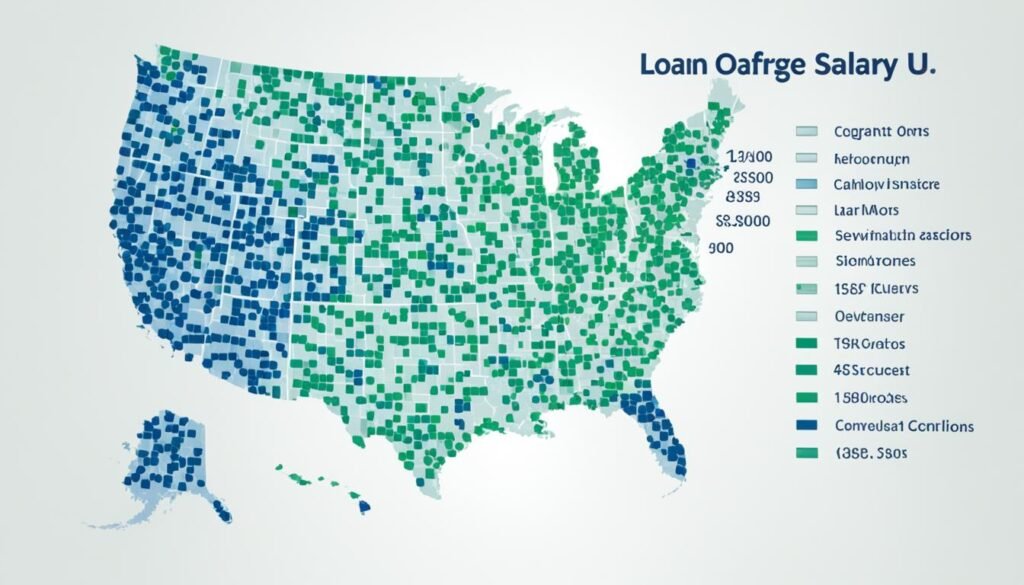How To Become A loan officer career offers opportunities to assist individuals, small businesses, and companies in borrowing money for various purposes. Whether it’s a mortgage loan, educational loan, or small business loan, loan officers play a crucial role in evaluating loan applications, guiding borrowers through the process, and providing exceptional customer service. This career path resides within financial institutions such as banks, credit unions, and mortgage companies, offering a stable and rewarding profession.
Interested in pursuing a loan officer career? This comprehensive guide will walk you through the necessary steps, from training to licensure, to help you achieve your goal.
Key Takeaways:
- Becoming a loan officer can lead to a rewarding career in the financial industry.
- Loan officers evaluate, authorize, and recommend loan applications, assisting borrowers in understanding loan terms.
- The median annual salary for a loan officer is $63,380, with variations based on experience and location.
- Employment for loan officers is projected to grow 4 percent between 2021 and 2031.
- To become a loan officer, consider earning a degree in finance or a related field and obtaining the necessary licenses.
What is a loan officer?
A loan officer is a finance professional who assists individuals, small businesses, and companies in borrowing money to achieve their goals. They play a vital role in the lending process, helping borrowers navigate various types of loans such as mortgage loans, educational loans, small business loans, and automobile loans. Loan officers evaluate loan applications, assess borrowers’ creditworthiness, and educate borrowers on loan terms.
Loan officers are knowledgeable in financial matters and use their expertise to guide borrowers through the lending process. They review loan applications, analyze borrowers’ financial history, and make recommendations on loan approvals. Additionally, loan officers provide customer service, answering questions and addressing concerns to ensure a smooth borrowing experience.
A loan officer’s primary goal is to help individuals and businesses secure the funding they need while adhering to lending guidelines and regulations. By offering their expertise and assistance, loan officers play a crucial role in helping individuals achieve their financial aspirations.
What does a loan officer do?
A loan officer plays a crucial role in the loan application process, assisting borrowers in securing the funding they need. Let’s take a closer look at the tasks performed by a loan officer, the loan process they navigate, and the importance of customer service in their role.
Loan Officer Tasks
Loan officers receive and assess loan applications from individuals, small businesses, and companies. They carefully analyze borrowers’ financial history, including credit scores, income, and debt levels, to determine their creditworthiness. Based on their evaluation, loan officers make recommendations on loan approvals or denials.
In addition to evaluating loan applications, loan officers guide borrowers through the entire loan process. They explain loan terms, answer questions, and provide guidance on documentation requirements. Loan officers act as a point of contact for borrowers, ensuring they understand the loan process and have the necessary information to make informed decisions about their financial options.
Customer service is a vital aspect of a loan officer’s responsibilities. Loan officers must possess excellent communication skills to interact with borrowers effectively. They address concerns, resolve issues, and provide support throughout the loan application and approval stages. Delivering exceptional customer service is essential for building trust and maintaining positive relationships with borrowers.
The Loan Process
The loan process typically involves several steps, with a loan officer guiding borrowers through each phase:
- Application: Borrowers submit their loan applications, providing details about their financial situation, purpose of the loan, and desired loan amount.
- Evaluation: Loan officers review the applications, assessing the borrower’s creditworthiness through careful analysis of financial documents and credit reports.
- Approval: Based on the evaluation, loan officers make recommendations on loan approvals or denials. If approved, they determine the loan terms, such as interest rates, repayment periods, and monthly payment amounts.
- Documentation: Loan officers assist borrowers in gathering the required documentation, such as income statements, tax returns, and proof of identity. They ensure all necessary paperwork is complete and accurate.
- Underwriting: Loan officers work with underwriters to assess the risk associated with the loan and ensure it meets the lending institution’s guidelines.
- Closing: Once the loan is approved and all necessary documentation is in order, loan officers coordinate the loan closing process. This involves signing the loan agreement, transferring funds, and finalizing the loan transaction.
Throughout the loan process, loan officers maintain open lines of communication with borrowers, providing updates, addressing concerns, and ensuring a smooth experience.
Customer Service Importance
Customer service is a vital aspect of a loan officer’s role. Loan officers strive to deliver exceptional service to borrowers, addressing their needs and concerns promptly and professionally. By providing personalized assistance and guidance, loan officers build trust and establish long-term relationships with borrowers.
Strong customer service skills enable loan officers to effectively communicate loan terms, answer questions, and alleviate any doubts or confusion borrowers may have. Loan officers serve as a reliable resource during the loan process, ensuring borrowers feel supported and confident in their financial decisions.
Ultimately, loan officers play a critical role in helping individuals and businesses secure the funding they need, guiding them through the loan process, and providing exceptional customer service every step of the way.
How much do loan officers make?

Being a loan officer can be a financially rewarding career. According to the US Bureau of Labor Statistics (BLS), the median annual salary for loan officers is $63,380. However, it’s important to note that several factors can affect a loan officer’s salary.
One of the primary factors influencing loan officer salaries is the employer. Different financial institutions may offer varying compensation packages, which can include base salaries, commissions, and bonuses.
Experience level also plays a significant role in determining a loan officer’s earning potential. As loan officers gain more experience and expertise in the field, their salaries tend to increase. They may also have access to higher commission rates and bonus structures.
The skill set of a loan officer can also impact their salary. Loan officers with exceptional customer service skills, strong sales abilities, and a deep understanding of financial products may be able to negotiate higher salaries or earn more in commission.
Location is another crucial factor influencing loan officer salaries. Salaries can vary significantly across different states and regions due to variations in cost of living and demand for loan services. For example, states such as New Mexico, Maine, and Rhode Island often offer higher average salaries for loan officers, while states like Idaho, Utah, and Mississippi may have lower average salaries.
Commissions and Bonuses
In addition to their base salaries, loan officers can also earn commissions and bonuses. Commissions are typically a percentage of the loan amount that loan officers help to originate. The more loans a loan officer successfully closes, the higher their commission earnings. Bonuses may be awarded for meeting or exceeding sales targets or other performance metrics.
Comparing Average Loan Officer Salaries by State
| State | Average Salary |
|---|---|
| New Mexico | $73,690 |
| Maine | $73,440 |
| Rhode Island | $73,130 |
| Idaho | $42,800 |
| Utah | $43,230 |
| Mississippi | $47,710 |
These figures provide a glimpse into the potential salary differences for loan officers across states, illustrating the importance of location in determining earning potential.
It’s important to note that salary figures are subject to change over time and may vary based on the specific circumstances of each loan officer. Researching salary trends, considering factors such as experience, location, and skill set, and negotiating salary packages can help loan officers maximize their earning potential.
Loan officer job outlook

The employment for loan officers is projected to experience a 4 percent growth between 2021 and 2031, according to the Bureau of Labor Statistics (BLS). This positive outlook is driven by the ongoing demand for loans in various sectors, including housing, education, and small business expansion. As the economy continues to grow, the need for loan officers is expected to increase.
This projected growth indicates promising prospects for individuals pursuing a career as a loan officer. With the continuous need for financial assistance, loan officers play a crucial role in facilitating loans and helping borrowers achieve their goals.
“As the economy continues to grow, the demand for loan officers is expected to increase.”
Loan officers are instrumental in providing individuals, small businesses, and companies with the necessary financial support to fuel their aspirations. This not only contributes to personal and business development but also supports the overall economic growth of the nation.
Industry-Specific Demand
The demand for loan officers varies across different industries. Here are some sectors where loan officers play a vital role:
- Housing: Loan officers assist individuals in obtaining mortgages to purchase homes or invest in real estate properties.
- Education: Loan officers help students secure educational loans for pursuing higher education or vocational training.
- Small Business: Loan officers facilitate loans for entrepreneurs and small business owners to start or expand their ventures.
The Role of Economic Growth
The employment outlook for loan officers is closely tied to the overall health of the economy. As economic conditions improve, people gain confidence in making financial decisions, leading to an increased demand for loans. A robust economy stimulates borrowing activity, creating more opportunities for loan officers to assist borrowers. Therefore, as economic growth continues, the need for loan officers is expected to rise.
The Importance of Loan Officer Expertise
Loan officers possess a deep understanding of the lending process and are equipped to guide borrowers through complex financial decisions. Their expertise ensures that loan applications are thoroughly evaluated, leading to informed recommendations and optimal loan approvals.
Loan officers’ ability to navigate the intricacies of the lending industry helps borrowers achieve their financial objectives while mitigating risks for the lending institutions.
How to become a loan officer

To pursue a career as a loan officer, there are several steps you can take to enhance your qualifications and increase your chances of success. Here’s a breakdown of the essential requirements and recommended path:
- Earn a degree in finance, economics, or a related field: While a specific educational requirement may not be mandatory, many employers prefer candidates with at least a bachelor’s degree. Acquiring knowledge in finance-related subjects can provide a strong foundation for a career in lending.
- Obtain the necessary licenses: Licensing requirements can vary depending on the state and the type of loans you will be working with. If you plan to specialize in mortgage loans, you will need to obtain a Mortgage Loan Originator (MLO) license and register with the National Mortgage Licensing System (NMLS). Research your state’s requirements to ensure compliance.
- Develop essential loan officer skills: As a loan officer, you will need to have a thorough understanding of mortgage loans, customer service, communication, documentation, and software applications. Keeping up with industry trends and refining your skills will make you a valuable asset to borrowers and lending institutions alike.
Becoming a loan officer is a rewarding career choice that requires a combination of education, licensing, and skills. By following these steps, you can position yourself for success in the lending industry.
Apply for loan officer jobs

Once you have met the necessary qualifications, it’s time to start your job search as a loan officer. Applying for loan officer positions can be an exciting step towards a rewarding career in finance. Here are some key steps to help you navigate the loan officer job search:
1. Update Your Resume
Before you begin applying for loan officer positions, make sure your resume is up to date and tailored to highlight your qualifications and relevant experience. Include any previous roles in finance, customer service, or related fields, as well as any certifications or licenses you may have obtained.
2. Practice Your Interviewing Skills
Preparing for loan officer job interviews is crucial to make a strong impression on potential employers. Research common interview questions and practice your responses. Highlight your knowledge of loan processes, customer service skills, and ability to assess borrower creditworthiness.
3. Explore Job Opportunities
Take advantage of online job platforms like Glassdoor, LinkedIn, and Indeed to search for loan officer job openings. These sites allow you to filter search results based on location, industry, or specific employer criteria. Be sure to review job descriptions and requirements to ensure a good fit.
4. Be Proactive
In addition to online job listings, consider reaching out to local banks, credit unions, and mortgage companies directly to inquire about loan officer positions. Sometimes, companies may not advertise job openings, but they are open to considering qualified candidates who express interest.
5. Networking and Professional Associations
Networking is a valuable tool for finding job opportunities in the financial industry. Join professional associations such as the Mortgage Bankers Association (MBA) or attend industry conferences and events to connect with influential individuals and expand your professional network. Networking can lead to valuable referrals or job openings that may not be advertised publicly.
Remember, loan officer positions can be found in various industries, including finance, education, construction, government, healthcare, and more. Don’t limit yourself to a single sector and explore diverse opportunities to find the right fit for your skills and interests.
By following these steps and staying proactive, you’ll increase your chances of finding loan officer job openings and securing a rewarding career in the finance industry.
| Job Search Tips for Loan Officers | Benefits |
|---|---|
| Update your resume | Highlights your relevant qualifications |
| Practice interviewing skills | Present yourself confidently and articulately |
| Explore job opportunities on online platforms | Access a wide range of positions and industries |
| Be proactive and reach out to companies directly | Uncover hidden job opportunities |
| Network with professionals in the industry | Gain referrals and insider information |
Take advantage of these tips to kickstart your loan officer job search and embark on an exciting career helping individuals and businesses secure the funding they need.
Starting out as a loan officer

As a loan officer, establishing yourself in the industry requires proactive prospecting and building relationships with real estate agencies. By partnering with reputable agencies, you can gain valuable client referrals, making it an essential aspect of your career.
Building a strong professional network and making a lasting impression are crucial for success in this field. When interacting with real estate agencies, it is important to demonstrate your expertise, reliability, and excellent customer service skills. By fostering positive relationships, you increase your chances of receiving quality referrals.
For freshly licensed loan officers, it may be beneficial to seek employment with established businesses. This provides an opportunity to gain invaluable experience, learn from seasoned professionals, and tap into an existing client base. Working alongside experienced colleagues can accelerate your learning curve and help you navigate the intricacies of the loan officer profession.
Benefits of partnering with real estate agencies:
- Access to a consistent stream of client referrals.
- Opportunity to collaborate with experienced real estate professionals.
- Increased visibility and credibility in the real estate market.
- Exposure to a wider range of loan opportunities.
- Potential for long-term partnerships and repeat business.
Building relationships and prospecting:
To effectively build relationships with real estate agencies, consider the following strategies:
- Attend industry events and networking opportunities: Participate in local real estate conferences, chamber of commerce events, and social gatherings to connect with industry professionals and expand your network.
- Offer educational resources: Share valuable insights and educational content with real estate agents to position yourself as a trusted advisor. This can be done through in-person presentations, webinars, or by providing e-books and articles.
- Maintain regular communication: Stay in touch with real estate agencies by sending updates on loan products, industry trends, and changes in lending regulations. This helps to keep you top of mind when they encounter clients in need of financing.
- Provide exceptional customer service: Strive to exceed expectations and provide a seamless experience for borrowers referred by real estate agencies. This ensures a positive impression and increases the likelihood of future collaborations.
- Show appreciation: Acknowledge the referrals you receive from real estate agencies by expressing gratitude and showing your appreciation. This helps foster stronger relationships and encourages continued referral partnerships.
Quote:
“Building strong relationships with real estate agencies is the cornerstone of a successful loan officer’s career. By prospecting and demonstrating your value, you can establish yourself as a trusted partner in the real estate industry.” – Jane Smith, Mortgage Specialist
By effectively prospecting and building relationships with real estate agencies, you can position yourself as a reliable loan officer and open doors to a steady flow of clients.
| Benefits | Strategies |
|---|---|
| Access to client referrals | Attend industry events and networking opportunities |
| Collaboration with experienced professionals | Offer educational resources |
| Increased visibility and credibility | Maintain regular communication |
| Exposure to a wider range of loan opportunities | Provide exceptional customer service |
| Potential for long-term partnerships | Show appreciation for referrals |
Remember, success as a loan officer is built on trust, collaboration, and a strong professional network. By prioritizing relationship building with real estate agencies, you can lay a solid foundation for a prosperous career.
Maintaining active licensure

Once licensed, loan officers must meet specific requirements to maintain their active licensure status. This ensures that loan officers stay updated with industry practices and regulations, providing the highest level of service to borrowers.
Annual License Renewal
Loan officers must renew their licenses on an annual basis. License renewal involves submitting the necessary paperwork, fees, and documentation to the appropriate licensing authority. It is crucial for loan officers to adhere to the renewal deadlines to avoid any disruptions in their ability to practice as a licensed loan officer.
Continuing Education Courses
To stay current in the industry, loan officers are required to complete continuing education courses. These courses cover relevant topics such as changes in lending regulations, best practices in customer service, and updates in loan application processes. By participating in continuing education, loan officers enhance their knowledge and skills, allowing them to provide borrowers with the most up-to-date information and guidance.
Keeping Information Up to Date
Loan officers must ensure that all their information filed with the National Mortgage Licensing System (NMLS) is accurate and up to date. This includes personal and contact information, employment history, and any disciplinary or legal actions. Maintaining accurate records with the NMLS helps to maintain transparency and professionalism in the industry.
Loan officers should also regularly review and understand any changes to licensing requirements and regulations in their state. Staying informed is essential for preserving active licensure status and delivering quality service to borrowers.
| Licensure Requirements | Details |
|---|---|
| License Renewal | Annual renewal of loan officer license |
| Continuing Education | Completion of specified number of continuing education courses |
| Information Updates | Keeping personal, contact, and professional information up to date with the NMLS |
What Else Is There to Know About Becoming a Mortgage Loan Officer in California?
Step 3: Review the Texas mortgage licensing requirements
Step 1: Request your NMLS account
Join the Morty platform as a mortgage loan originator
California Mortgage Loan Officer | Requirements to Become an MLO Through NMLS
Step 5: Prepare for the national mortgage SAFE Test
Loan officer salary and job outlook
Conclusion
Becoming a loan officer can open doors to a rewarding career in the financial industry. As a loan officer, you have the opportunity to help individuals and businesses achieve their financial goals and contribute to a stable home-buying market. However, success in this profession requires the right qualifications, skills, and commitment to continuous learning and development.
To thrive as a loan officer, it is essential to possess a strong understanding of financial products and services, as well as excellent customer service and communication skills. A solid educational background in finance or a related field can provide a strong foundation for your career. Additionally, obtaining the necessary licenses, such as the Mortgage Loan Originator (MLO) license, is crucial for working in the mortgage industry.
Continuing education is vital for loan officers to stay current with industry trends, regulations, and best practices. Ongoing professional development helps loan officers enhance their knowledge and skills, ensuring they provide the best possible service to their clients. By participating in relevant training programs and staying informed about changes in the lending industry, loan officers can maintain their licensure and remain competitive in the field.
FAQs
Q: What is a mortgage loan officer?
A: A mortgage loan officer is a professional who helps individuals secure financing to purchase a home or refinance an existing mortgage.
Q: How can I become a mortgage loan officer?
A: To become a mortgage loan officer, you typically need to meet certain education requirements, pass a licensing exam, and gain work experience in the field.
Q: What is the NMLS?
A: The NMLS, or Nationwide Mortgage Licensing System, is a system that mortgage loan officers use to apply for, renew, and manage their licenses.
Q: What are the requirements to become a mortgage loan officer?
A: The requirements to become a mortgage loan officer vary by state but often include completing pre-licensure education, passing an exam, and undergoing a background check.
Q: How do I get a mortgage loan officer license in California?
A: To get a mortgage loan officer license in California, you must meet the state’s specific licensing requirements, which include completing pre-licensure education and passing an exam.
Q: What is the process of becoming an MLO?
A: The process of becoming a Mortgage Loan Officer (MLO) involves completing the required education, passing the licensing exam, and applying for a license through the NMLS.
Q: Where can I find more information about becoming a mortgage loan officer?
A: You can find more information about becoming a mortgage loan officer by visiting the NMLS website or contacting your state’s regulatory agency for licensing information.
Source Links
- https://www.knowledgecoop.com/pages/become-a-mortgage-loan-officer
- https://www.coursera.org/articles/loan-officer
- https://www.oncourselearning.com/mortgage/mortgage-career-insights/how-to-become-a-loan-officer
